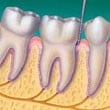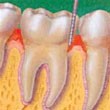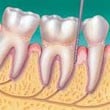/do-i-have-gum-disease Almost 1 in 5 men and 1 in 8 women die from heart disease.
Almost 1 in 5 men and 1 in 8 women die from heart disease.
Heart Disease is responsible for 82,000 deaths in the UK each year, an average of 224 people each day.
To decrease our risk, we do the obvious. We eat healthy, exercise, lose weight, control diabetes, lower cholesterol, control high blood pressure and decrease stress, but there is one that might not be so obvious. It is cheap, easy and you probably already do it. It is brushing and flossing your teeth!
A recent study of more than 11,000 adults confirm previous research linking gum disease with heart problems. The study took into account factors that affect heart disease risk, such as social class, obesity, smoking and family history. However, researchers found those with the worst oral hygiene had a 70% increased chance of developing the condition compared with those who brush their teeth twice a day.
One theory is that oral bacteria can affect the heart when they enter the blood stream, attaching to fatty plaques in the coronary arteries (heart blood vessels) and contributing to clot formation. Coronary artery disease is characterized by a thickening of the walls of the coronary arteries due to the build-up of fatty proteins. Blood clots can obstruct normal blood flow, restricting the amount of nutrients and oxygen required for the heart to function properly. This may lead to heart attacks.
People who are at risk of cardiovascular disease or have signs of gum disease are encouraged to consult with their dentist.
Gum disease also increases your risk of all kinds of other health complications, including stroke, diabetes and rheumatoid arthritis.
The link between oral health and overall body health is well documented and backed by robust scientific evidence. Despite this, only one in six people realises that if you have gum disease you may have an increased risk of stroke or diabetes. Only one in three is aware of the heart disease link.
What is Gum Disease?
Gum disease is inflammation of the gums that can progress to affect the bone that surrounds and supports your teeth.
There are two main stages in gum disease:
 Healthy Gums
Healthy Gums
Healthy gums are firm and don't bleed. They fit snugly around individual teeth.

Gingivitis:
- Is the early phase of gum disease.
- Your gums are inflamed, may appear red or swollen and may bleed during brushing
- At this early stage in gum disease, the damage can be reversed, since the bone and deeper connective tissues that hold the teeth in place are not yet affected.

Periodontitis:
At this stage your gums begin to separate and recede from your teeth. This allows plaque to move toward the roots, affecting supporting deeper tissues and bone.
In the final stages of gum disease, the bone supporting your teeth are destroyed. This may cause your teeth to become loose and can affect how well you can chew your food. Your Dentist may need to extract affected teeth.
How is Gum Disease Treated?
The early stages of gum disease can often be reversed with effective brushing and flossing. Good daily oral hygiene will help keep plaque from building up.
Professional cleaning by your dentist is the only way to remove plaque that has built up and hardened into tartar. Visit your dentist to will clean your teeth and to remove the tartar above and below the gum line.
If your gum condition is more severe, you may require surgery. Remember, after successful treatment, you still need to take extra care of your gums to make sure gum disease doesn’t come back.
The best way to look after your gums is by visiting your dentist at regular intervals.
%MCEPASTEBIN%


.png?width=320&name=Request%20(1).png)

